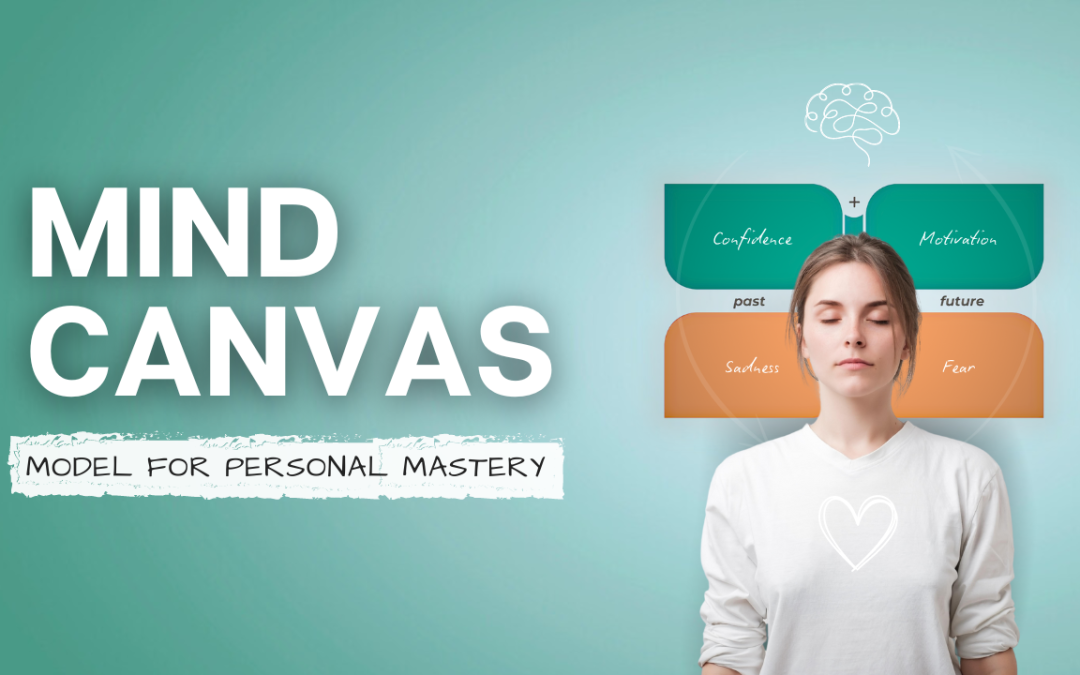Do you have one of those minds that simply won’t stop thinking?
And what about the quality of those thoughts?
Are they empowering you, or taking away your energy, peace, and well-being?
Being able to see your own mind and change it at will must be difficult, considering that psychology is not a simple thing to grasp… or is it?
People study for years to understand psychology and become therapists or practitioners. But you don’t need to go to such lengths to master your mind and your emotions. In fact, it can be much easier and faster than you think.
That’s part of my mission in life: to make psychology simple and intuitive, eradicate unnecessary suffering, and raise humanity’s consciousness.
That’s why I created the Mind Canvas: a simple and intuitive model of how your mind works; a visual, user-friendly interface to your mind.
Introducing: The Mind Canvas
The Mind Canvas™ is a visual model—or metaphor—of how your mind works. It is to your mind what operating systems like Windows 95 were to computers almost 30 years ago.
You see, computers have changed our lives. They have become so ingrained in our daily routines that we can’t really imagine our lives without them. There was a time when, unless you were a computer programmer, you couldn’t do much with them. For doing simple things like creating folders and saving documents, we would have literally had to write lines of code on our screens. We were very limited. And to make important changes to the code, we would need to call a professional.
Until one day, operating systems like Windows 95 came along and they revolutionized the computer world by allowing us to forget the code and simply click and move things around in a visual way. That’s why these operating systems are called Visual Interfaces. They provide us with a user-friendly visual metaphor for how we create and organize things in the real world, like a desktop, folders, documents, and trashcans. Since then, normal people, like you and me, were empowered. Their limitations were taken away and they could get much more from their computers than ever before.
The Mind Canvas is like Windows 95 because it is a visual, user-friendly interface for your mind. It is a visual metaphor for how your mind works. It helps you become aware of what you are doing in your own mind at any time, of how you are putting yourself in limiting emotional states, and how to shift into more self-empowering perspectives and thought patterns. It empowers you to become the master of your own reality, anytime, anywhere, without having to depend on experts like coaches or therapists to recode or reprogram your mind and to take control of your well-being and of your life.
“The mind is like a computer. It runs programs. Most of the software has been poorly written. It is written in the language of fear.”
Frederick Lenz
Having a simplified map to your mind, allows you to see where you are today and what direction to take in order to get to where you want to be. In the words of J.P. Morgan: “The first step towards getting somewhere is to decide that you are not going to stay where you are.”
Here’s a short, animated 5-minute introduction video to the Mind Canvas:
A gift for you
We have put together a special free e-course to introduce you to the power of your Mind Canvas: Mind Resourcefulness Course
In this free, short e-course, you will:
- Learn about Personal Mastery and Life-Self Dynamic through the Mind Canvas model.
- Gain extra insight into your mind through the Mind Resourcefulness Assessment.
Inside, you will find:
- 20 insightful lessons
- 6 high-quality explainer videos
- 1 Workbook
- 1 Assessment
- Questions for self-reflection
I hope you enjoy this resource we have put together with so much love.
Let me know your thoughts, insights or questions in the comment section below.
Until then…
InJoy, Juan Campoo

About the author
Juan Campoo is a seasoned transformational coach and behavioral expert facilitating personal and organizational evolution. Creator of the Mind Canvas model for personal mastery and writer of the Amazon Best-Selling book under the same name. In the last 10+ years, he has coached, trained, and taught more than 12.000 people either 1-on-1, in groups, or through online courses. Check out other free resources here.


